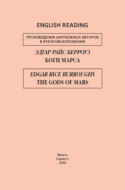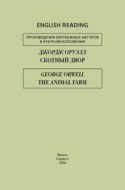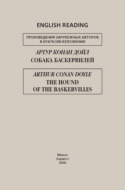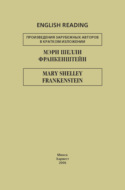Kitabı oku: «The Secret Garden / Таинственный сад», sayfa 2
Chapter IV
Martha
When she opened her eyes in the morning it was because a young housemaid had come into her room to light the fire and was kneeling on the hearth-rug raking out the cinders 36 37 noisily. Mary lay and watched her for a few moments and then began to look about the room. She had never seen a room at all like it and thought it curious and gloomy. The walls were covered with tapestry 38 with a forest scene embroidered on it. There were fantastically dressed people under the trees and in the distance there was a glimpse of the turrets 39 of a castle. There were hunters and horses and dogs and ladies. Mary felt as if she were in the forest with them. Out of a deep window she could see a great climbing stretch of land which seemed to have no trees on it, and to look rather like an endless, dull, purplish sea.
After that Mary began to talk with the housemaid about the moor. The housemaid told her about it with great interest.
Mary listened to her with a grave, puzzled expression. The native servants she had been used to in India were not in the least like this. They were obsequious 40 and servile 41 42 and did not presume to talk to their masters as if they were their equals. They made salaams'1 and called them “protector of the poor” and names of that sort. They say “please” and “thank you” and Mary had always slapped her Ayah in the face when she was angry. She wondered a little what this girl would do if one slapped her in the face. She was a round, rosy, good- natured-looking creature, but she had a sturdy way which made Mistress Mary wonder if she might not even slap back- if the person who slapped her was only a little girl.
“You are a strange servant,” she said from her pillows, rather haughtily.
Martha sat up on her heels, with her blacking-brush in her hand, and laughed, without seeming the least out of temper.
“Eh! I know that,” she said. “If there was a grand Missus at Misselthwaite I should never have been even one of th' under house-maids. I might have been let to be scullery maid 43but I'd never have been let upstairs. I'm too common an' I talk too much Yorkshire. But this is a funny house for all it's so grand. Seems like there's neither Master nor Mistress except Mr. Pitcher an' Mrs. Medlock. Mr. Craven, he won't be troubled about anythin' when he's here, an' he's nearly always away. Mrs. Medlock gave me th' place out o' kindness. She told me she could never have done it if Misselthwaite had been like other big houses.”
“Are you going to be my servant?” Mary asked, still in her imperious little Indian way.
Martha began to rub her grate again.
Martha did not expect to hear that. She was so amazed. She began to speak in broad Yorkshire but Mary did not understand her at all. At first Martha thought that Mary was a black. These words made Mary furious. She began to call Martha bad words. She did not even try to control her rage and humiliation. Somehow she suddenly felt so horribly lonely and she threw herself face downward on the pillows and burst into tears. She cried so loud that good-natured Martha was a little frightened and quite sorry for her. She bent over her and beg her pardon. There was something comforting and really friendly in her queer Yorkshire speech and Mary gradually stopped crying and became quiet. Martha looked relieved. When Mary at last decided to get up, the clothes Martha took from the wardrobe were not the ones she had worn when she arrived the night before with Mrs. Medlock. The dressing process was one which taught them both something. Martha had “buttoned up” her little sisters and brothers but she had never seen a child who stood still and waited for another person to do things for her as if she had neither hands nor feet of her own.
It had not been the custom that Mistress Mary should do anything but stand and allow herself to be dressed like a doll, but before she was ready for breakfast she began to suspect that her life at Misselthwaite Manor would end by teaching her a number of things quite new to her-things such as putting on her own shoes and stockings, and picking up things she let fall. If Martha had been a well-trained fine young lady's maid she would have been more subservient 44 45 and respectful and would have known that it was her business to brush hair, and button boots, and pick things up and lay them away. She was, however, only an untrained Yorkshire rustic1 who had been brought up in a moorland cottage with a swarm of little brothers and sisters who had never dreamed of doing anything but waiting on themselves and on the younger ones who were either babies in arms or just learning to totter about and tumble over 46 things.
At first Mary listened to Martha very coldly and wondered at her freedom of manner. But later she began to notice what she was saying. Martha told Mary about her family and especially about Dickon who liked animals and had his own pony.
Mary had never possessed an animal pet of her own and had always thought she should like one. So she began to feel a slight interest in Dickon, and as she had never before been interested in any one but herself, it was the dawning of a healthy sentiment 47 When she went into the room which had been made into a nursery for her, she found that it was rather like the one she had slept in. It was not a child's room, but a grown-up person's room, with gloomy old pictures on the walls and heavy old oak chairs. A table in the center was set with a good substantial breakfast. But she had always had a very small appetite, and she looked with something more than indifference at the first plate Martha set before her.
Martha made her eat porridge but she did not want. She said that she did not know what it was to be hungry. Martha looked indignant. She said if Dickon and Phil had been there they would have eaten the whole breakfast. She also added that when she had a day off she would go home to help her mother. Listening to her, Mary drank some tea and ate a little toast and some marmalade. After that Martha said to Mary to run out and play but she did not want to play alone. Martha convinced her to go by herself just to learn to play like other children did when they did not have sisters and brothers. Martha found her coat and hat for her and a pair of stout little boots and she showed her her way downstairs. She warned her that one of the gardens was locked up. No one had been in it for ten years. There was another locked door added to the hundred in the strange house. Mr. Craven had it shut when his wife died so sudden. He won't let no one go inside. It was her garden. He locked the door and dug a hole and buried the key.
After she was gone Mary turned down the walk which led to the door in the shrubbery 48. She could not help thinking about the garden which no one had been into for ten years. She wondered what it would look like and whether there were any flowers still alive in it. When she had passed through the shrubbery gate she found herself in great gardens, with wide lawns and winding walks with clipped borders. There were trees, and flower-beds, and evergreens 49clipped into strange shapes, and a large pool with an old gray fountain in its midst. But the flower-beds were bare and wintry and the fountain was not playing. This was not the garden which was shut up. How could a garden be shut up? You could always walk into a garden.
She was just thinking this when she saw that, at the end of the path she was following, there seemed to be a long wall, with ivy growing over it. She was not familiar enough with England to know that she was coming upon the kitchengardens where the vegetables and fruit were growing. She went toward the wall and found that there was a green door in the ivy 50, and that it stood open. This was not the closed garden, evidently, and she could go into it.
She went through the door and found that it was a garden with walls all round it and that it was only one of several walled gardens which seemed to open into one another. She saw another open green door. The place was bare and ugly enough, Mary thought, as she stood and stared about her. Presently an old man with a spade over his shoulder walked through the door leading from the second garden. He did not seem at all pleased to see her. Mary asked a permission to go to the kitchen-garden. The old man allowed her to do that. She went down the path and through the second green door. There, she found more walls, but in the second wall there was another green door and it was not open. Perhaps it led into the garden which no one had seen for ten years. Mary went to the green door and turned the handle. It opened quite easily and she walked through it and found herself in an orchard. There were walls all round it also and trees trained against them but there was no green door to be seen anywhere. Mary looked for it, and yet when she had entered the upper end of the garden she had noticed that the wall did not seem to end with the orchard but to extend beyond it as if it enclosed a place at the other side. She could see the tops of trees above the wall, and when she stood still she saw a bird sitting on the topmost branch of one of them, and suddenly he burst into his winter song.
She stopped and listened to him and somehow his cheerful, friendly little whistle gave her a pleased feeling- even a disagreeable little girl may be lonely, and the big closed house and big bare moor and big bare gardens had made this one feel as if there was no one left in the world but herself. If she had been an affectionate child, who had been used to being loved, she would have broken her heart, but even though she was “Mistress Mary Quite Contrary” she was desolate, and the bright-breasted little bird brought a look into her sour little face which was almost a smile. She listened to him until he flew away. He was not like an Indian bird and she liked him and wondered if she should ever see him again. Perhaps he lived in the mysterious garden and knew all about it.
Perhaps it was because she had nothing whatever to do that she thought so much of the deserted garden. She was curious about it and wanted to see what it was like. She wanted to ask Mr. Craven why he had done such queer things.
“She thought of the robin 51 and of the way he seemed to sing his song at her, and as she remembered the tree-top he perched on she stopped rather suddenly on the path.
“I believe that tree was in the secret garden-I feel sure it was,” she said. “There was a wall round the place and there was no door.”
She walked back into the first kitchen-garden she had entered and found the old man digging there. She went and stood beside him and watched him a few moments in her cold little way. He took no notice of her and so at last she spoke to him.
“I have been into the other gardens,” she said.
“There was nothin' to prevent thee,” he answered crustily.
“I went into the orchard.”
“There was no dog at th' door to bite thee,” he answered. “There was no door there into the other garden,” said Mary. “What garden?” he said in a rough voice, stopping his digging for a moment.
“The one on the other side of the wall,” answered Mistress Mary. “There are trees there-I saw the tops of them. A bird with a red breast was sitting on one of them and he sang.”
To her surprise the face of the gardener actually changed its expression. And he looked quite different. He turned about to the orchard side of his garden and began to whistle. Almost the next moment a wonderful thing happened. She heard a soft little rushing flight through the air-and it was the bird with the red breast flying to them. Then he spoke to the bird as if he were speaking to a child.
The bird put his tiny head on one side and looked up at him with his soft bright eye which was like a black dewdrop 52. He seemed quite familiar and not the least afraid. He hopped about and pecked the earth briskly, looking for seeds and insects. It actually gave Mary a queer feeling in her heart, because he was so pretty and cheerful and seemed so like a person. He had a tiny plump body and a delicate beak 53, and slender delicate legs.
“Will he always come when you call him?” she asked almost in a whisper.
“Aye, that he will. I've knowed him ever since he was a fledgling 54. He come out of th' nest in th' other garden an' when first he flew over th' wall he was too weak to fly back for a few days an' we got friendly. When he went over th' wall again th' rest of th' brood was gone an' he was lonely an' he come back to me.”
The gardener told about the bird with such a love. He looked at the plump little robin as if he were proud of him. The robin hopped about busily pecking the soil and now and then stopped and looked at Mary a little. It really seemed as if he were finding out all about her. Mistress Mary went a step nearer to the robin and looked at him very hard. She said that she was very lonely. The old gardener pushed his cap back on his bald head and stared at her a minute. Then he began to dig again, driving his spade deep into the rich black garden soil while the robin hopped about very busily employed.
“What is your name?” Mary inquired.
He stood up to answer her.
“Ben Weatherstaff,” he answered, and then he added with a surly chuckle 55, “I'm lonely mysel' except when he's with me,” and he jerked his thumb toward the robin. “He's th' only friend I've got.”
“I have no friends at all,” said Mary. “I never had. My Ayah didn't like me and I never played with any one.”
It is a Yorkshire habit to say what you think with blunt frankness 56, and old Ben Weatherstaff was a Yorkshire moor man.
“Tha' an' me are a good bit alike,” he said. “We was wove out of th' same cloth. We're neither of us good lookin' an' we're both of us as sour as we look. We've got the same nasty tempers, both of us, I'll warrant.”
This was plain speaking, and Mary Lennox had never heard the truth about herself in her life. Native servants always salaamed and submitted to you, whatever you did. She had never thought much about her looks, but she wondered if she was as unattractive as Ben Weatherstaff and she also wondered if she looked as sour as he had looked before the robin came. She actually began to wonder also if she was “nasty tempered.” She felt uncomfortable.
Suddenly a clear little sound broke out near her and she turned round. It was the robin. He had flown on to one of the branches and had burst out into a song. Mary asked why he did it. The man answered that just to make friends with her. Mary was very surprised to hear that and she began to talk to the bird. The man said that she talk to him like Dickon talked to his wild things on the moor. Mary was amazed to hear that the old man knew Dickon.
Mary would have liked to ask some more questions. She was almost as curious about Dickon as she was about the deserted garden. But just that moment the robin, who had ended his song, gave a little shake of his wings, spread them and flew away. He had made his visit and had other things to do.
“He has flown over the wall!” Mary cried out, watching him. “He has flown into the orchard-he has flown across the other wall-into the garden where there is no door!”
“He lives there,” said old Ben. “He came out o' th' egg there. If he's courtin', he's makin' up to some young madam of a robin that lives among th' old rose-trees there.”
“Rose-trees,” said Mary. “Are there rose-trees?”
Ben Weatherstaff took up his spade again and began to dig.
“There was ten year' ago,” he mumbled.
“I should like to see them,” said Mary. “Where is the green door? There must be a door somewhere.”
Ben drove his spade deep and looked as uncompanionable 57as he had looked when she first saw him.
“There was ten year' ago, but there isn't now,” he said.
“No door!” cried Mary. “There must be.”
“None as any one can find, an' none as is any one's business. Don't you be a meddlesome wench 58 an' poke your nose where it's no cause to go. Here, I must go on with my work. Get you gone an' play you. I've no more time.”
And he actually stopped digging, threw his spade over his shoulder and walked off, without even glancing at her or saying good-by.
Chapter V
The Cry In The Corridor
At first each day which passed by for Mary Lennox was exactly like the others. Every morning she awoke in her tapestried room and found Martha kneeling upon the hearth building her fire; every morning she ate her breakfast in the nursery which had nothing amusing in it; and after each breakfast she gazed out of the window across to the huge moor which seemed to spread out on all sides and climb up to the sky, and after she had stared for a while she realized that if she did not go out she would have to stay in and do nothing-and so she went out.
She did not know that this was the best thing she could have done. She ran only to make herself warm, and she hated the wind which rushed at her face and roared and held her back as if it were some giant she could not see. But after a few days spent almost entirely out of doors she wakened one morning knowing what it was to be hungry. She took up her spoon and began to eat the porridge until her bowl was empty. Martha was glad to see that. Then she said Mary to go out and play. But Mary answered that she had nothing to play with. Martha exclaimed that she could just run about and shout and look at things. Mary walked round and round the gardens and wandered about the paths in the park. Sometimes she looked for Ben Weatherstaff, but though several times she saw him at work he was too busy to look at her.
One place she went to oftener than to any other. It was the long walk outside the gardens with the walls round them. There were bare flower-beds on either side of it and against the walls ivy grew thickly. There was one part of the wall where the creeping dark green leaves were more bushy than elsewhere. It seemed as if for a long time that part had been neglected. The rest of it had been clipped and made to look neat, but at this lower end of the walk it had not been trimmed at all.
A few days after she had talked to Ben Weatherstaff, Mary stopped to notice this and wondered why it was so. She had just paused and was looking up at a long spray of ivy swinging in the wind when she saw a gleam of scarlet and heard a brilliant chirp 59, and there, on the top of the wall, forward perched Ben Weatherstaff's robin redbreast, tilting 60forward to look at her with his small head on one side.
She spoke to him as if she were sure that he would understand and answer her. He did answer. He chirped and hopped along the wall as if he were telling her all sorts of things. It seemed to Mistress Mary as if she understood him, too, though he was not speaking in words. Mary began to laugh, and as he hopped and took little flights along the wall she ran after him. At last he spread his wings and made a darting flight to the top of a tree, where he sang loudly. That reminded Mary of the first time she had seen him.
“It's in the garden no one can go into,” she said to herself. “It's the garden without a door. He lives in there. How I wish I could see what it is like!”
She ran up the walk to the green door she had entered the first morning. Then she ran down the path through the other door and then into the orchard, and when she stood and looked up there was the tree on the other side of the wall, and there was the robin just finishing his song and, beginning to preen 61 his feathers with his beak.
“It is the garden,” she said. “I am sure it is.”
She walked round and looked closely at that side of the orchard wall, but she only found what she had found before- that there was no door in it. Then she ran through the kitchen-gardens again and out into the walk outside the long ivy-covered wall, and she walked to the end of it and looked at it, but there was no door; and then she walked to the other end, looking again, but there was no door.
It was very strange. Ben Weatherstaff said there was no door and there is no door. But there must have been one ten years ago, because Mr. Craven buried the key. This gave her so much to think of that she began to be quite interested and feel that she was not sorry that she had come to Misselthwaite Manor. She stayed out of doors nearly all day, and when she sat down to her supper at night she felt hungry and drowsy and comfortable. She did not feel cross when Martha chattered away. She felt as if she rather liked to hear her and she decided to ask a question.
“Why did Mr. Craven hate the garden?” she said.
She had made Martha stay with her and Martha had not objected at all. She was very young, and used to a crowded cottage full of brothers and sisters, and she found it dull in the great servants' hall downstairs where the footman and upper-housemaids made fun of her Yorkshire speech and looked upon her as a common little thing, and sat and whispered among themselves. Martha liked to talk, and the strange child who had lived in India, and been waited upon by “blacks,” was novelty enough to attract her.
She sat down on the hearth herself without waiting to be asked.
“Art tha' thinkin' about that garden yet?” she said. “I knew tha' would. That was just the way with me when I first heard about it.”
“Why did he hate it?” Mary persisted.
“Mind,” she said, “Mrs. Medlock said it's not to be talked about. There's lots o' things in this place that's not to be talked over. That's Mr. Craven's orders. His troubles are none servants' business, he says. But for th' garden he wouldn't be like he is. It was Mrs. Craven's garden that she had made when first they were married an' she just loved it, an' they used to 'tend the flowers themselves. An' none o' th' gardeners was ever let to go in. Him an' her used to go in an' shut th' door an' stay there hours an' hours, readin' and talkin'. An, she was just a bit of a girl an' there was an old tree with a branch bent like a seat on it. An' she made roses grow over it an' she used to sit there. But one day when she was sittin' there th' branch broke an' she fell on th' ground an' was hurt so bad that next day she died. Th' doctors thought he'd go out o' his mind an' die, too. That's why he hates it. No one's never gone in since, an' he won't let any one talk about it.”
Mary did not ask any more questions. She looked at the red fire and listened to the wind “wutherin'.” It seemed to be “wutherin' ” louder than ever. At that moment a very good thing was happening to her. Four good things had happened to her, in fact, since she came to Misselthwaite Manor. She had felt as if she had understood a robin and that he had understood her; she had run in the wind until her blood had grown warm; she had been healthily hungry for the first time in her life; and she had found out what it was to be sorry for some one.
But as she was listening to the wind she began to listen to something else. She did not know what it was, because at first she could scarcely distinguish it from the wind itself. It was a curious sound-it seemed almost as if a child were crying somewhere. Sometimes the wind sounded rather like a child crying, but presently Mistress Mary felt quite sure this sound was inside the house, not outside it. It was far away, but it was inside. She turned round and looked at Martha.
“Do you hear any one crying?” she said.
Martha suddenly looked confused.
“No,” she answered. “It's th' wind. Sometimes it sounds like as if some one was lost on th' moor an' wailin'. It's got all sorts o' sounds.”
“But listen,” said Mary. “It's in the house-down one of those long corridors.”
And at that very moment a door must have been opened somewhere downstairs; for a great rushing draft62 blew along the passage and the door of the room they sat in was blown open with a crash, and as they both jumped to their feet the light was blown out and the crying sound was swept down the far corridor so that it was to be heard more plainly than ever.
“There!” said Mary. “I told you so! It is some one crying- and it isn't a grown-up person.”
Martha ran and shut the door and turned the key, but before she did it they both heard the sound of a door in some far passage shutting with a bang, and then everything was quiet. Martha said that it was the wind or little Betty Butterworth, the scullery-maid. She has had the toothache all day. But Mary did not believe she was speaking the truth.
Ücretsiz ön izlemeyi tamamladınız.






